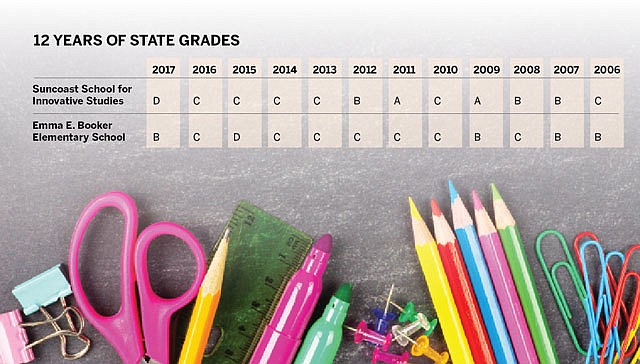- April 26, 2025
-
-
Loading

Loading

The new Florida Department of Education grades for schools are out, and once again Sarasota County schools earned an A grade and one of the highest grades among counties statewide.
Keep in mind that the state’s schools are graded on a curve, to facilitate comparisons, and Florida recently toughened up its standards. A school only needs 62% of the possible points it could score to get an A. Only three schools in Sarasota County even got 80% of the possible points — Southside Elementary with an 80%, Lakeview Elementary with an 81% and, of course, Pine View got a 93%. Out of the 50 schools in the county, 27 received As, 15 Bs, 7 Cs and one a D.
That said, the scores do seem to capture how well schools are doing compared to one another. The D grade was a charter school—Suncoast School for Innovative Studies — and that provokes some thinking about the role of charter schools in Sarasota.
Charter schools are permitted more autonomy in exchange for delivering better student achievement for fewer taxpayer dollars. SSIS is a Title 1 school, which means it serves a high percentage of low income and academically struggling kids. The school’s scores show pretty low performance overall, particularly in math and science.
The Sarasota County School Board was quick to point this out at a recent meeting, asking why SSIS’s scores were so low. Board member Eric Robinson specifically asked why SSIS did so much more poorly than Emma E. Booker Elementary, a conventional public school that is also Title 1 and has similar students, which got a B grade from the state this year. And these questions were covered in the local news.
This kind of accountability is good and what these grades should lead to. Poor performance has to be questioned and changes made. SSIS is required to submit to the school board a plan for how it will fix things and improve performance and is expected to have that plan this month.
If all schools were charter schools, it would be much easier to hold them accountable for poor scores, as the school board is now doing with SSIS. For example, in 2015 Emma E. Booker Elementary received a D grade. I searched the archives and can find no media coverage of questions being asked of them. Indeed, Emma E. Booker Elementary has never had an A grade from the state and has never faced the scrutiny SSIS is now under. SSIS, while a receiving a D this year and a C the two years before, is clearly struggling right now, but through 2012 received many two As and three Bs from the state (see table).
Clearly, even conventional schools fail at achievement, so to equate SSIS’s recent decline with its charter status would be unfair. Indeed, as a national movement and within Florida, charter schools are a huge success.
By tying their very funding and existence to achievement metrics, charter schools — a more business-type approach to education — are pushed to improve in a way that public schools are often not.
The experiences of Arizona and Ohio show the consequences of a lack of charter school oversight and accountability, but other states tell a different tale, showing charters as a huge success overall. In Boston, New York and Washington, D.C., a typical charter school student outscores a demographically similar kid in a conventional public school in reading and math by several months of learning (a measurement used in education analysis). New Orleans’s students, nearly 95% of whom are in charter schools, are among the fastest improving in the nation, with test scores, graduation rates and college acceptance rates skyrocketing. This is especially true for black students who now outperform their peers in English and math. In 2004, before the conversion to charter schools, 28% of black students scored proficient on state tests. By 2014, a few years after converting to charters, 59% did.
So let’s give charter schools the credit they deserve for helping students. Let’s take pride in the good performing schools in Sarasota County and applaud the school board for expecting SSIS to improve. This is how it should be — all about accountability and performance.
Adrian Moore is vice president of the Reason Foundation and lives in Sarasota.